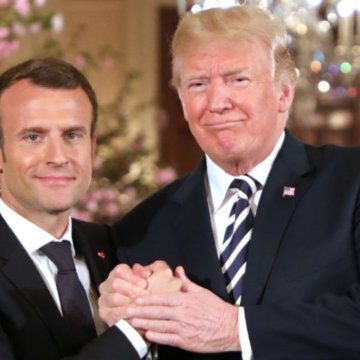- About
- Topics
- Picks
- Audio
- Story
- In-Depth
- Opinion
- News
- Donate
- Signup for our newsletterOur Editors' Best Picks.Send
Read, Debate: Engage.
Emmanuel Macron, President of the French, has an interesting reputation. His popularity rating among French voters has hovered around 40% for several months now, (as stated by Politico). According to right-wingers, he is the very embodiment of establishment privilege, taking power away from the rightful rulers of France, the Le Pens. To the left, he is just another bumbling neo-liberal, here to maintain the status-quo of big money against ordinary workers. Yet, to the centre (which is also a by-word for 'centre-right'), he is a kind of hero. He is the calm voice of logic and social progress against the tidal waves of populism; he is the voice of free-trade at a time of increased protectionism; he is the voice of sanity in an insane world.
I do not personally subscribe to this view, but I do acknowledge he was the lesser of two evils in last year's French elections. Nevertheless, he still represents a kind of evil: namely, the evil of 'centrist hubris'. This is the hubris of believing that reason and the most pared-down ideology possible, will in the end prevail. This is hubristic for the simple reason that people respond to politics emotionally, viscerally and very much ideologically. Believing that reason shall prevail, simply because it is reason, is, as a matter of fact, very unreasonable.
In Trump, Macron thought he had found a perfect vessel into which he could pour his particular brand of centrism (again, a demonstration of centrist hubris: realpolitik). For over a year, the two have buddied-up to one another, with mutual a benefit: Trump appears more reasonable with the cultured Macron, and the Frenchman appears to be a master of political manoeuvring whenever the President does his bidding.
However, on his recent trip to Washington, Macron failed to change the Trump administration's policy on Iran. The Iranian nuclear deal (which sees the Iranian regime abstaining from trying to produce a nuclear weapon in exchange for American money and cool diplomatic relations), has been under threat ever since Trump took office. The deal is widely held to be a masterstroke of political expediency by the Obama administration, and exactly the kind of centrist realpolitik that Macron wants to emulate; it acknowledges competing aims, while ensuring stability without resolving ideological differences. Trump and his retinue however are not reasonable people.
Iran has come to be something of a symbol for the Trump administration. A symbol of everything that America hates: independence from American power, yet a beneficiary of American power. Trump and his team demand subservience, not equality. And it is this which Macron, and his coterie of centrists have failed to understand: ideology and emotions are worth more to Trump and his team than reason. Reason states that the Middle-East should be stabilised and secured. Emotions state otherwise.
A realpolitik, which centrists will have to adjust to, is that we no longer live in a world of reason, rather, one of winning. And Trump will do all he can to win against Iran.
